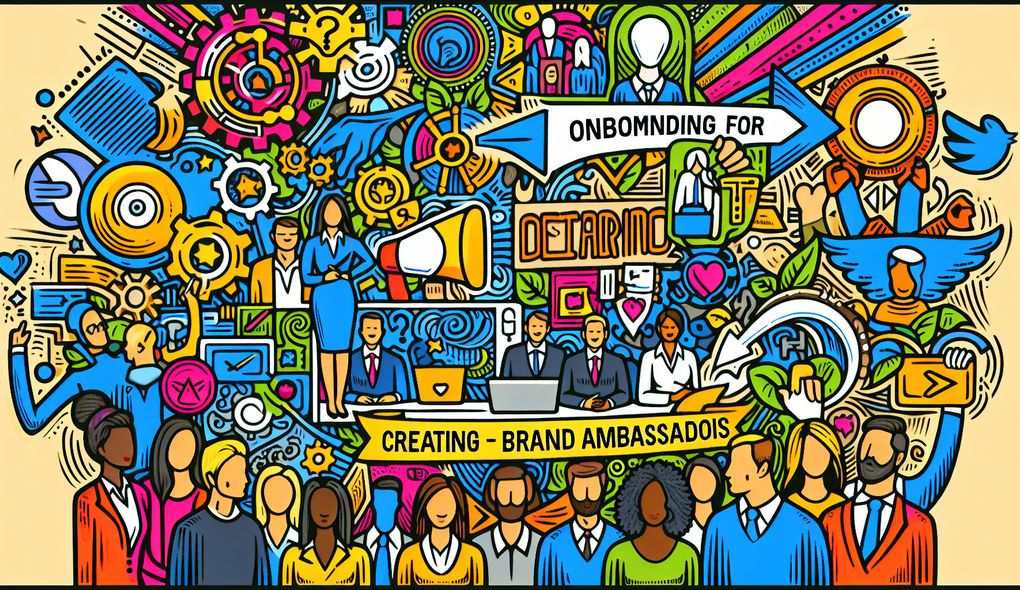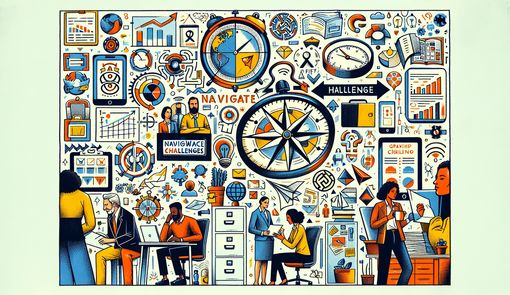Onboarding for Customer-Facing Roles: Creating Brand Ambassadors
Explore effective onboarding strategies for customer-facing roles to turn new hires into brand ambassadors.

Onboarding new hires into customer-facing roles is not just about teaching them the ropes; it's about cultivating brand ambassadors who can authentically represent your company's values and culture. For employees who will be the first point of contact for your clients, exceptional onboarding can make the difference between a positive customer experience and a lost opportunity. In this comprehensive guide, we will explore how to effectively onboard customer-facing employees and empower them to become passionate advocates for your brand.
Understanding the Importance of Onboarding
The onboarding process is vital in shaping an employee's relationship with your company. It's an opportunity to demonstrate your organization's commitment to employee growth and satisfaction. Investing in onboarding shows new hires that they are valued and that their work is significant to the company's success. This is even more crucial for customer-facing employees, as their attitudes and competence directly affect customer perceptions and, ultimately, your business's reputation and profitability.
Setting the Stage: Pre-Onboarding
An effective onboarding process for customer-facing roles begins even before the employee steps foot in the office. Pre-onboarding, which might include sending welcome packages, setting up access to communication tools, and providing necessary reading material, helps to alleviate first-day anxiety and fosters a sense of belonging right from the start.
The First Day: Creating a Memorable Experience
The first day is crucial in setting the tone. Welcome your new hires warmly, introduce them to the team, and give them a tour of your workspace. Ensure they have a well-organized workstation and that all the technical setups are in order. This reduces friction and allows the new employee to focus on learning and adapting to the new environment.
Comprehensive Training: More Than Just the Basics
Training for customer-facing roles should extend beyond the basic operational aspects of the job. It should encompass soft skills like communication, empathy, listening, and problem-solving. Role-playing scenarios and shadowing experiences can be invaluable in preparing employees for real customer interactions. Additionally, make sure to explain your company's expectations for customer service excellence.
Cultural Integration: Instilling Company Values
For customer-facing employees to effectively become brand ambassadors, they must internalize your company's values and culture. Organize interactive sessions where new hires can engage with the core principles of your company and understand the 'why' behind their role. Encourage them to ask questions and share ideas—it's a two-way street that benefits both the employee and the organization.
Feedback Loops: Continuous Learning and Improvement
Incorporate regular feedback sessions into the onboarding process. These can be with supervisors or through peer-to-peer feedback mechanisms. Continuous learning opportunities should also be available, whether through workshops, webinars, or e-learning platforms. This encourages ongoing development and helps to address any gaps in skill or knowledge quickly.
Mentoring and Support: The Human Touch
Assigning a mentor or buddy can significantly enhance the onboarding experience for new hires in customer-facing roles. A go-to person for questions and support helps ease the transition and can impart nuanced insights about dealing with customers that aren't found in training manuals.
Empowering Through Responsibility
Gradually giving new hires more responsibility is a great way to build confidence and ownership. This could begin with observatory roles, move on to assisting in customer interactions, and culminate in managing their own customer cases. This phased approach ensures they are fully prepared and capable of delivering the level of service expected from a brand ambassador.
Recognition and Rewards: Celebrating Success
Recognizing and rewarding positive behavior from the outset can strongly influence a new employee's engagement and commitment to their role. Whether through formal recognition programs or simple gestures of appreciation, celebrating successes helps to reinforce the right behaviors and attitudes.
Leveraging Technology: Streamline Onboarding with Tools
Make use of available technology to streamline the onboarding process. Use platforms that allow for easy tracking of a new hire's progress, and utilize online resources for training modules that can make learning more flexible and enjoyable.
Conclusion
Creating brand ambassadors out of customer-facing employees is a strategic process that requires a thoughtful, well-structured onboarding program. By focusing on every stage of the journey—from pre-onboarding to recognizing and rewarding success—you build a team well-equipped to represent your brand positively and deliver exceptional customer experiences. Invest in these beginnings, and watch as it pays dividends in customer loyalty, employee satisfaction, and overall company growth.
Frequently Asked Questions
1. Why is onboarding crucial for customer-facing roles?
Onboarding is essential for customer-facing roles because it sets the foundation for new hires to understand the company's values, culture, and expectations. It helps them adapt to their roles quickly, ensuring they represent the brand positively to customers.
2. What should pre-onboarding for customer-facing roles include?
Pre-onboarding for customer-facing roles should involve activities like sending welcome packages, setting up communication tools, providing reading materials, and creating a sense of belonging before the first day at work.
3. How can comprehensive training benefit customer-facing employees?
Comprehensive training goes beyond basic job operations and includes soft skills development like communication, empathy, and problem-solving. It prepares employees for real customer interactions, enhancing their ability to deliver exceptional service.
4. Why is cultural integration important in onboarding customer-facing employees?
Cultural integration helps customer-facing employees internalize the company's values and understand the 'why' behind their roles. It aligns their mindset with the brand's ethos, making them more authentic and effective brand ambassadors.
5. What role does mentoring play in the onboarding process for customer-facing roles?
Mentoring provides new hires in customer-facing roles with personalized support and guidance. Mentors can offer insights and tips on dealing with customers, enhancing the onboarding experience and accelerating learning.
6. How can recognition and rewards impact the onboarding experience?
Recognition and rewards reinforce positive behavior and motivate new employees to excel in their roles. Celebrating successes boosts engagement and encourages continued dedication to delivering excellent customer service.
7. How can technology enhance the onboarding process for customer-facing employees?
Technology can streamline onboarding by facilitating progress tracking, delivering online training modules, and making learning more flexible. It allows for efficient onboarding management and improves the overall experience for new hires.
Further Resources
For more in-depth insights and strategies on effective onboarding for customer-facing roles to create brand ambassadors, check out the following resources:
- The Ultimate Guide to Employee Onboarding - A comprehensive guide from the Society for Human Resource Management (SHRM) on employee onboarding best practices.
- Customer Service Training and Tutorials - LinkedIn Learning offers a wide range of customer service training courses to enhance employees' skills in customer interactions.
- Building a Company Culture That Drives Customer Success - HubSpot's guide on how to foster a company culture that aligns with customer success, vital for creating brand ambassadors.
- The Science of People Skills - Vanessa Van Edwards' Science of People provides resources and courses on improving communication and interpersonal skills, essential for customer-facing roles.
- Gamified Learning Platforms for Employee Engagement - Learn how gamification can enhance employee engagement and retention during the onboarding process.
- Effective Mentoring Techniques - Forbes article detailing effective mentoring techniques to support new hires and foster their professional growth.
- Employee Recognition Ideas - Explore a variety of employee recognition ideas to implement within your organization and boost employee morale.
- Top Onboarding Software Solutions - Software Advice provides a comparison of top onboarding software solutions to help streamline and automate the onboarding process.
- Customer Experience Management Tools - Gartner's glossary on customer experience management tools for optimizing customer interactions and satisfaction.
- Best Practices for Building a Strong Company Culture - Insperity's blog post offering insights into cultivating a robust company culture that resonates with employees and customers alike.
Explore these resources to enhance your understanding of onboarding strategies and empower your customer-facing employees to become exceptional brand ambassadors.

 Resume and Cover Letter Writing
Resume and Cover Letter Writing Interview Preparation
Interview Preparation Career Development
Career Development Networking and Personal Branding
Networking and Personal Branding Workplace Skills
Workplace Skills Job Search Strategies
Job Search Strategies Work-Life Balance
Work-Life Balance Salary Negotiation
Salary Negotiation Career Transitions
Career Transitions Navigating Workplace Challenges
Navigating Workplace Challenges Professional Growth
Professional Growth Trends in the Workplace
Trends in the Workplace